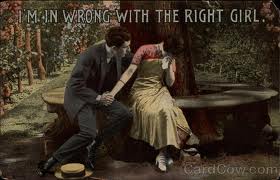“I’ve been thinking about you two,” Trish said, “and about how I can best help.”
The last time Warren and I were in this therapist’s office, we had some heated discussions about The Future—Ours, His, Mine—The House, Retirement, The Economy, The Funds (now and forthcoming).
He, who has lived in the same community—within a ten-mile radius—his entire life, is not daunted by the rising crime and declining growth.
I’ve often said, “The River runs through his veins, not blood.”
His is the mentality, “I was born here. I’m going to die here.”
I had suggested we should talk about The Future and consider the many options available to us, including A Move.
And I took his, “I’m okay with selling the rentals” to mean End of Discussion.
“Rather delve into language and how people talk to one another, I like to look at Attachment Injury,” said Trish.
The pain that arises as result of trauma. Emotional trauma.
She shared with me some observations she’d made regarding the way I express my anguish surrounding Warren’s last affair.
“Sometimes you tend to toss in these zingers,” she began, “and I’m not sure that is helpful to the situation.”
Condemnation not only adds additional attachment injury, it convolutes the source of our own distress
And then she offered an alternative, “Just share with him your pain. Only your pain. Cut out the story.”
Ha!
The irony of asking a story teller to eliminate The Story from the conversation added a bit of comic relief to our session.
Zingers? Um, I thought, okay, yeah, I think I understand what she means…
What I was about to realize wholeheartedly, however, is exactly what those barbs are, and just how excruciating it is to share the depth of hurt without them, without the incorporation of blame and reproach.
“I felt like I was blindsided.
“I couldn’t trust you.
“I couldn’t trust other people.
“I couldn’t trust myself.
“I couldn’t trust logic or what I knew—thought I knew—in my head to be accurate.
“It felt crazy, like everything was all twisted together and nothing made sense.”
I turned to Trish, “The first time around I, we, blamed the affair on our circumstances, Gavin’s death, the business, his parents’ interference—”
“Remember,” the mediator said, “just your pain.”
I couldn’t trust my heart.
“I am sorry I—” Warren began his usual statement of apology.
And I did something I’ve been noticing these past few years: I instinctively balled my fists and shook my forearms by the side of my head, as if to shield my ears and my brain.
“What?” Warren questioned.
“You say that as casually as if you were explaining to me how to…how to paint a wall. There’s no emotion.”
“I mean it,” he said.
And then my frustration and anger came through.
“I am not some fucking sheet of wallboard! I am a human and you hurt me terribly! And you act like a god-damned robot—mechanical—it’s all just mechanical.”
Tears of frustration and sadness flowed freely.
“You know, with the first affair, when you slept with my best friend (The Zinger), you cried over her, Warren. You cried when you told me you loved her and that you didn’t know what to do. You fucking cried over her.” (Zinger)
In that moment I realized there was still some unresolved grief regarding his first tryst.
“I hated how you were the one who caused all of the pain and conflict and disruption in our family, (Zingers) and yet you went on acting as if nothing had changed. My children saw me being neurotic, heard me yelling and crying, and felt my withdrawal because I was so confused and exhausted from it all. And the crazy-making part? You, nothing happened to you. “There weren’t any consequences. You walked through every single day unscathed and came off smelling and looking like a god-damned rose!” (Zinger. Zinger. Zinger.)
“Remember. Yourpain. Without the slights,” Trish prodded when I took a breath.
“But you haven’t shed one drop over me. You say you’re sorry, but, honestly, when it comes right down to it, I don’t believe you. I don’t think you really mean it and I am scared to death of being hurt like that, again.”
Raw, undiluted grief allows us to tap into the wellspring of our fears, the origins of our outrage and our suffering.
Personal. Keep it personal.
“I didn’t feel attractive, didn’t feel loved, didn’t feel like I mattered, or like I was as important to you as they were.”
The essence of how insignificant I felt in our relationship gushed from my gut.
“I felt like I didn’t have any value at all.”
“I don’t see your remorse and I don’t feel it, so I’m constantly searching for signs, like the time you were standing on a ladder, holding a drill and a board overhead, yet you still answered the phone. That wasn’t staged or planned or rehearsed.”
“I don’t know what else to say or do,” Warren interjected.
Trish asked him if anyone had ever hurt him, if he’d ever felt a deep sense of loss.
She rephrased the question to clarify emotional hurt, when he indicated he’d never been hurt.
“No, no one’s ever done anything to me like that,” he said, “any pain I’ve ever felt has been self-inflicted, it’s all been caused by my own actions.”
He feels responsible for everything—his father’s verbal abuse, the dysfunction. Classic. The child in him still can’t admit to parental shortcomings.
The look of incredulity flashed across my face as a grin and I had to apologize to Warren and ask him to continue before I interjected this thought.
“I’m ashamed of what I did to you and I’m… I’m embarrassed.”
Warren’s words were slowing.
“I can’t begin to imagine how much hurt you feel, because I’ve never been hurt like that. It makes me sick to see so you in so much pain.”
His eyes, which darted away from Trish and me, took on a glassy look, in what appeared to be restrained sadness.
“The one person in the world who means the most to me…the person I care about more than anything else, and…and…I caused it…”
His words had been becoming softer, yet gravelly in his throat. “I did this,” he ended, “Idid this…”
Somewhere in there he made a reference to being punished.
And I realized he had never understood my references that he’d never endured any effect from his destructive choices.
All this time I’d felt as if the conflict had fallen at my feet, and then lain there as a mess that everyone expected me to clean up.
“I’m sorry if you’ve felt that I wanted you punished. I never wanted retribution. I’ve always said I didn’t want the kids to hate you or turn away from you, and I’ve tried to express that it was the dynamic of it all that was just so paradoxical.”
I felt the lump forming in my own throat.
“You know, this is the first time in our twenty-some years together that you have ever expressed how important I am to you.”
A sense of monumental relief washed over me.
“You’ve never even hinted that I mean that much to you, let alone am the most important person in your life.”
I do matter.
“And this is the first time since your affairs that I see that they did have an effect on you, the first time your acknowledgement has seemed sincere. The first time it felt…genuine.”
Warren shared that he didn’t understand the difference between what he’d just said and what he’d been saying.
When Trish urged him to think about how he was feeling while he was speaking, he recognized the symptoms in his “shaking hands, beating heart, and labored speech.”
“I guess I’ve just always had a hard time with the emotional stuff,” he said, “and so I thought I was letting you know all those things with my actions. But I can see, now, why it’s been so hard for you.”
“I love you, Warren. Thank you,” I said, “thank you for loving me enough to do this work.”
“And thank you, Trish, for saying Yes. There were so many Nos. I’m just so, so grateful. Thank you.”
End of Session.
Let healing at its very core commence…
What about you? Have you experienced a breakthrough in communication or conflict resolution with a partner? Have you experienced an Attachment Injury? Please share your story here and spread courage and resource for others who are searching, grappling, for some sort of promise.


